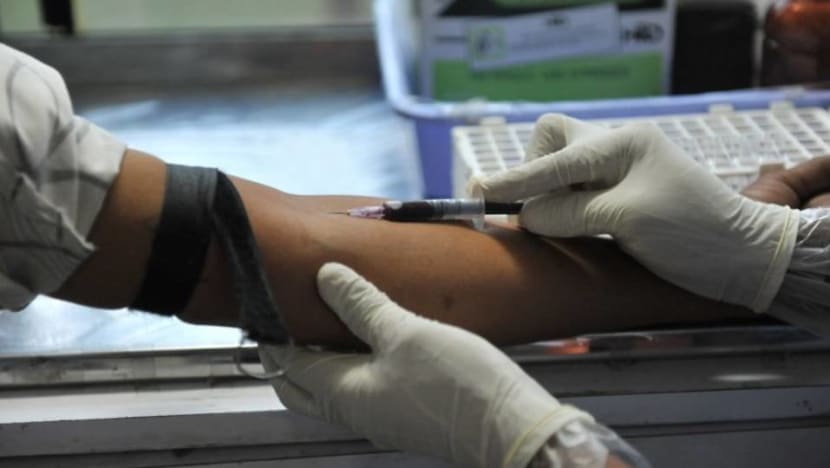250 new cases of HIV infections reported among Singapore residents in 2021, lowest in 18 years

A healthcare worker draws a blood sample from a man getting tested for HIV/AIDS. (Photo: AFP/ Noah SEELAM).
SINGAPORE: There were 250 new cases of human immunodeficiency virus (HIV) infections reported among Singapore residents in 2021, the Ministry of Health said on Friday (Jul 1).
The last time Singapore reported fewer cases than this was in 2003, when there were 242 infections. In 2020, there were 261 cases.
Of the 250 new cases in 2021, 95 per cent were male and about two-thirds were aged 20 to 49, MOH said in its update.
Sexual intercourse remains the main mode of HIV transmission, with 95 per cent of the cases acquiring the infection this way, MOH added.
Men who have sex with men accounted for 62 per cent of the cases and heterosexual transmission accounted for 33 per cent of cases, while bisexual transmission accounted for 3 per cent, MOH said.
About 18 per cent of them were detected during routine programmatic HIV screening and 16 per cent were detected from self-initiated HIV screening.
The rest were detected through “other forms of screening”, MOH said.
More than half of the newly reported cases were detected during the course of medical care and typically at a late stage of HIV infection, MOH said.
“Cases detected via self-initiated screening tended to be at the early stage of infection,” MOH said.
MOH added that a higher proportion of men who have sex with men, 23 per cent, had their HIV infection detected via self-initiated HIV screening compared to the 6 per cent of heterosexuals
The total number of HIV-infected Singapore residents stands at 9,129 as of end-2021. Among them, 2,255 have died.
HIV SELF-TESTING
MOH said that from Aug 1 this year, the National HIV Programme, which is under the National Centre for Infectious Diseases, will introduce HIV self-testing.
HIV self-testing kits will be available at the Department of Sexually Transmitted Infections Control Clinic and Action for AIDS (AfA) Anonymous Test Site at 31 Kelantan Lane.
“HIV self-testing can be done in the privacy of one’s home and involves self-collection of oral specimen using a swab,” MOH said.
The results can be obtained within 20 to 40 minutes. Each HIV self-test kit costs between S$20 and S$32.
However, the result of a single rapid diagnostic test such as the HIV self-test is not sufficient to make a HIV-positive diagnosis, MOH said.
Individuals with a positive result from the self-testing kit should therefore receive further confirmatory testing from a healthcare provider and be referred for treatment.
A negative test result also does not mean that the individual is not infected with HIV, MOH added.
“As it can take up to three months for antibodies to develop following HIV infection before they can be detected by the self-test kits, a recent infection may not be detected unless a second test is performed three months after the first test,” MOH said.
HIV testing is also available at healthcare institutions, including polyclinics, private clinics, hospitals, and at anonymous HIV test sites where personal particulars are not required when undergoing a HIV test.
Those at higher risk of HIV infection should test more frequently and see a health care provider to discuss options for preventive measures and testing, MOH said.
Going for HIV testing is the only way to know one’s HIV status, MOH added, saying that regular testing and early diagnosis allow those living with HIV to be treated early and achieve better treatment outcomes.
This also provides an opportunity to protect their partners from infection as persons living with HIV who are on treatment and have an undetectable viral load have practically no risk of transmitting the virus to their sexual partners, MOH said.
“With early and effective treatment, people living with HIV can lead lives no different from others,” MOH said.
PREVENTING HIV INFECTION
The most effective way to prevent HIV infection is to remain faithful to one’s spouse or partner and to avoid casual sex, or sex with sex workers, MOH said.
MOH urged persons engaging in high-risk sexual behaviour, such as having multiple sexual partners or engaging in casual or commercial sex, to use condoms to reduce their risk of HIV infection and other sexually-transmitted infections.
Condoms should be used consistently and correctly during every sexual encounter, MOH said.
In addition, the use of preventive measures like HIV pre-exposure prophylaxis – medicine taken to prevent getting HIV - are highly effective when used as part of a comprehensive HIV prevention strategy.















